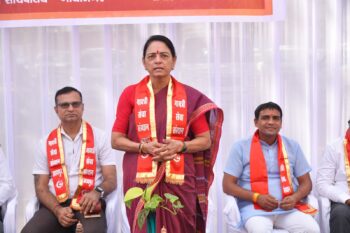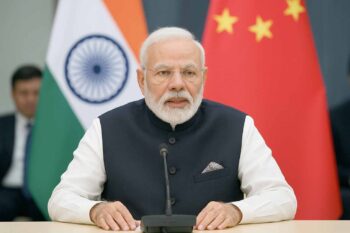PM Releases education and skill curriculum books translated into 12 Indian languages

PM inaugurates Akhil Bhartiya Shiksha Samagam at Bharat Mandapam in Delhi
“Our education system has a huge role in achieving the goals with which 21st century India is moving”
“In NEP traditional knowledge and futuristic technologies have been given the same importance”
“Education in the mother tongue is initiating a new form of justice for the students in India. It is also a very significant step towards social justice”
LIVE: PM Shri @narendramodi inaugurates Akhil Bharatiya Shiksha Samagam at Bharat Mandapam https://t.co/qy5hv2EayS
— BJP Gujarat (@BJP4Gujarat) July 29, 2023
“When students are confident in a language, their skills and talent will emerge without any restrictions”
“We have to create an energetic new generation in the next 25 years of Amrit Kaal, a generation free from the mentality of slavery, eager for innovations and filled with a sense of duty”
“Equality in education means that no child is deprived of education due to place, class, or region”
“In the age of 5G, PM- SHRI schools will be a medium of modern education”
“IIT campuses opened in Zanzibar and Abu Dhabi. Many other countries are also urging us to open IIT campuses in their own countries”
The National Education Policy aims to make India a hub for research and innovation. Speaking at the Akhil Bharatiya Shiksha Samagam. https://t.co/bYOjU6kby5
— Narendra Modi (@narendramodi) July 29, 2023
New Delhi, The Prime Minister, Shri Narendra Modi inaugurated Akhil Bhartiya Shiksha Samagam at Bharat Mandapam in Delhi today. It coincides with the 3rd anniversary of National Education Policy 2020. He also released the first installment of funds under the PM SHRI Scheme.
6207 schools received the first installment with a total amounting to 630 crore Rupees. He also released education and skill curriculum books translated into 12 Indian languages. The Prime Minister also took a walkthrough of the exhibition showcased on the occasion.
Addressing the gathering, the Prime Minister underlined the primacy of education among the factors that can change the destiny of the nation. “Our education system has a huge role in achieving the goals with which 21st century India is moving”, he said. Emphasizing the importance of the Akhil Bhartiya Shiksha Samagam, the Prime Minister said that discussion and dialogue are important for education.
PM Shri @narendramodi interacts with children and visits an exhibition at the inauguration of Akhil Bharatiya Shiksha Samagam in New Delhi. pic.twitter.com/iO4d0r3VCl
— BJP (@BJP4India) July 29, 2023
The Prime Minister mentioned the coincidence of the last Akhil Bhartiya Shiksha Samagam taking place in the newly constructed Rudraksha convention center of Varanasi and this year’s Akhil Bhartiya Shiksha Samagam taking place in the brand new Bharat Mandapam. This is the first event at the Mandapam after its formal inauguration.
From the Rudraksha of Kashi to the modern Bharat Mandapam, the Prime Minister said that there is a hidden message in the journey of Akhil Bhartiya Shiksha Samagam of amalgamation of ancient and modern. He said that on the one hand, the educational system of India is preserving the ancient traditions of the land while on the other hand, the nation is fast progressing in the field of science and technology. The Prime Minister congratulated those who have contributed to the education sector for the progress made so far. Noting that today marks the third anniversary of the National Educational Policy, the Prime Minister thanked the intellectuals, academicians and teachers for taking this up as a mission and contributing towards the immense progress. Speaking about the exhibition showcased on the occasion, the Prime Minister highlighted the display of skills and education and innovative techniques. He touched upon the transforming face of education and schooling in the country where small children are learning via playful experiences and expressed optimism for the same. He also urged the guests to explore the exhibition.
All set and ready for the Akhil Bharatiya Shiksha Samagam.
Hon. PM @narendramodi ji will inaugurate the two-day Shiksha Mahakumbh shortly. #NEPThrivesAt3 pic.twitter.com/iPyMDDDufo
— Dharmendra Pradhan (@dpradhanbjp) July 29, 2023
The Prime Minister said that epoch-making changes take some time. Recalling the vast canvas to be covered at the time of the inauguration of the NEP, the Prime Minister praised the dedication and willingness to embrace new concepts of all the stakeholders. He said that in NEP traditional knowledge and futuristic technologies have been given the same importance. He mentioned the hard work of the stakeholders from the world of education for the new curriculum in primary education, books in regional languages, for higher education and for strengthening the research ecosystem in the country. He said students now understand that in place of the 10+2 system now the 5+3+3+4 system is in operation. Education will begin at the age of 3 bringing uniformity in the entire country. He also informed that the Cabinet has approved the introduction of the National Research Foundation Bill in the Parliament. The National Curriculum Framework under the NEP will come soon. The framework for 3-8 years old students is ready. The entire country will have a uniform syllabus and NCERT is preparing new course books for this. The Prime Minister informed that new books of about 130 various subjects are coming up for classes 3 to 12 in 22 different languages as a result of education being imparted in regional languages.
The Prime Minister pointed out that the biggest injustice to any student is judging them based on their language instead of their capabilities. “Education in the mother tongue is initiating a new form of justice for the students in India. It is also a very significant step towards social justice”, the Prime Minister remarked. Noting the multitude of languages in the world and their importance, the Prime Minister underlined that many developed nations of the world have got the edge owing to their local language. Giving the example of Europe, the Prime Minister said that most countries make use of their own native languages. He lamented that even though India has an array of established languages, they were presented as a sign of backwardness, and those who could not speak English were neglected and their talents were not recognised. As a result, the Prime Minister said, the children of the rural areas remained most affected. He emphasized that the country has now begun to shun this belief with the advent of the National Educational Policy. “Even at the UN, I speak in Indian language”, Shri Modi added.
The Prime Minister underlined that subjects ranging from social science to engineering will now be taught in Indian languages. “When the students are confident in a language, their skills and talent will emerge without any restrictions”, Shri Modi said. He also pointed out that those who try to politicize language for their own selfish interests will now have to shut their shops. “National Educational Policy will give due respect and credit to every language in the country”, he said.
The Prime Minister said that we have to create an energetic new generation in the next 25 years of Amrit Kaal. A generation free from the mentality of slavery, eager for innovations and ready to bring laurels in fields from science to sports, willing to skill themselves as per the needs of the 21st century, a generation filled with a sense of duty. “NEP will play a big role in this”, he said.
The Prime Minister said among the various parameters of quality education, India’s big effort is for equality. “Priority of NEP is that every youth of India should get the same education and the same opportunity for education”, he said, emphasizing that this is not limited to opening schools. He emphasized that equality should be extended to resources along with education. This, he said, means that every child should get options as per choice and capacity. “Equality in education means that no child is deprived of education due to place, class, region”, he said. He pointed out that thousands of schools are being upgraded under the PM SHRI Scheme. “In the age of 5G, these modern schools will be a medium of modern education”, he added. He mentioned Eklavya Schools in tribal villages, Internet facilities in villages and students receiving education through modes like DIKSHA, SWAYAM and Swayamprabha. “Now, In India, the gap of resources needed for education is being covered rapidly”, he said.
The Prime Minister highlighted the steps for integrating vocational education with general education and the ways of making education more interesting and interactive. Pointing out that the facility of labs and practicals were limited to a handful of schools earlier, the Prime Minister threw light on Atal Tinkering Labs where more than 75 lakh students are learning about science and innovation. “Science is simplifying itself for everyone. It is these young scientists that will shape the future of the country by leading significant projects and turn India into a research hub of the world”, he said.
“Any reform requires courage, and the presence of courage leads to the birth of new possibilities”, Shri Modi said as he underlined that the world is looking at India as a nursery of new possibilities. The Prime Minister gave examples of software technology and space tech and said that it is not easy to compete with India’s capability. Speaking about defence technology, the Prime Minister said that India’s model of ‘low cost’ and ‘best quality’ is sure to be a hit. He emphasized that the respect for India’s education system has significantly increased in the world with the increase in India’s industrial reputation and startup growth ecosystem. He noted that the number of Indian institutes is increasing in all the global rankings and informed about two IIT campuses opening up in Zanzibar and Abu Dhabi. “Many other countries are also urging us to open IIT campuses in their own countries”, he said. He also touched upon many global universities willing to open their campuses in India due to the positive changes coming in the education ecosystem. He informed that two Australian universities are about to open their campuses in Gujarat’s GIFT City. Shri Modi emphasized strengthening educational institutions continuously and working towards making them future-ready. He stressed the need to make India’s institutes, universities, schools and colleges as the center of this revolution.
The Prime Minister emphasized that “building capable youth is the biggest guarantee of building a strong nation” and parents and teachers play a major role in that. He appealed to teachers and parents to prepare students for confident curiosity and flights of imagination. “We have to keep an eye on the future and think with a futuristic mindset. We have to free the children from the pressure of books”, he said.
The Prime Minister talked about the responsibility that growing global curiosity in a strong India places on us. He reminded about acquainting the students of the importance of Yoga, Ayurveda, art and literature. He concluded by reminding the teachers about the importance of the current generation of students in India’s journey to a ‘Viksit Bharat’ in 2047.
Union Minister for Education and Skill Development and Entrepreneurship, Shri Dharmendra Pradhan was present on the occasion among others.
Background
Guided by the vision of the Prime Minister, NEP 2020 was launched with a view to groom the youth and prepare them for leading the country in Amrit Kaal. It aims to prepare them for meeting the challenges of the future while keeping them grounded in basic human values. During the three years of its implementation the policy has brought radical transformation in the realms of school, higher and skill education. The two-day programme, being held on 29th and 30th July, will provide a platform for academics, sector experts, policymakers, industry representatives, teachers and students from schools, higher education and skilling institutions, among others, to share their insights, success stories and best practices in implementing the NEP 2020 and work out strategies for taking it further ahead.
The Akhil Bhartiya Shiksha Samagam will include sixteen sessions, in which discussions will be held on themes including Access to Quality Education and Governance, Equitable and Inclusive Education, Issues of Socio-Economically Disadvantaged Group, National Institute Ranking Framework, Indian knowledge System, Internationalisation of Education, among others.
During the programme, the Prime Minister released the first installment of funds under the PM SHRI Scheme. These schools will nurture students in a way that they become engaged, productive, and contributing citizens for building an equitable, inclusive, and plural society as envisaged by National Education Policy (NEP) 2020. The Prime Minister also released education and skill curriculum books translated into 12 Indian languages.




